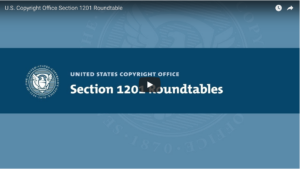 The Cyberlaw Clinic is preparing for the last segment in the seventh triennial proceeding for exemptions to the anti-circumvention clause of the DMCA—the oral hearings, which are to be held on April 12th, at 2:00 p.m. ET in Washington, D.C and will be livestreamed online here. At this hearing, there will be two panels of testifying witnesses—one in support of the exemption, the other in opposition—appearing before a panel of Copyright Office representatives. The Clinic is coordinating the efforts of the supporting experts, which includes Cyberlaw Clinic Instructional Fellow Kendra Albert, Jessica Meyerson of the Software Preservation Network, Henry Lowood of the Stanford University Libraries, Lyndsey Jane Moulds of Rhizome at the New Museum, and Jonathan Band of the Library Copyright Alliance. The majority of the time will be spent addressing specific questions posed by the Copyright Office during the hearing.
The Cyberlaw Clinic is preparing for the last segment in the seventh triennial proceeding for exemptions to the anti-circumvention clause of the DMCA—the oral hearings, which are to be held on April 12th, at 2:00 p.m. ET in Washington, D.C and will be livestreamed online here. At this hearing, there will be two panels of testifying witnesses—one in support of the exemption, the other in opposition—appearing before a panel of Copyright Office representatives. The Clinic is coordinating the efforts of the supporting experts, which includes Cyberlaw Clinic Instructional Fellow Kendra Albert, Jessica Meyerson of the Software Preservation Network, Henry Lowood of the Stanford University Libraries, Lyndsey Jane Moulds of Rhizome at the New Museum, and Jonathan Band of the Library Copyright Alliance. The majority of the time will be spent addressing specific questions posed by the Copyright Office during the hearing.
These upcoming oral hearings follow the last round of comments, for which the Cyberlaw Clinic filed a reply comment on behalf of the Software Preservation Network. (Thank you to Austin Bohn, Erin Thomas, and Erika Herrera for their hard work on the reply comment.)
The comment focused on responding to arguments and objections raised by the plethora of opposition comments submitted on February 12th. The opposition comments were an opportunity for parties opposing the exemption to submit arguments following the initial comment submitted in December. Hearteningly, opponents generally agreed that the preservation of digital works is a worthwhile effort and that current systems are ineffective. To that end, there was general support for an exemption to further enable software preservation, but the disagreement came in the practical details and scope of the proposed exemption.
In its reply, the Clinic continued to emphasize the urgent need to preserve the software and digital works that are continually becoming more vital parts of society. As mentioned in a prior blog post, software loss is an urgent problem that is only worsening as new content and information are “born digital.” The research and study of software history, the development of future software, and the preservation of software-dependent works rely on the institutions that engage in software archival pursuits.
Narrowing the exemption
The class of works proposed in the original comment was limited by both use and user, requiring the user be a library, museum, archive, or other cultural heritage institution using it for the purposes of preservation. But in order to further address the opponents’ concerns that the exemption is too broad, the Clinic proposed a compromise: limiting the class of works to software that is “no longer reasonably available in the marketplace.” Adding this constraint reduces the number of works covered by the exemption to those most urgently in need of preservation and reduces the already minimal risk of market impact. Meanwhile, it remains a workable standard that preservationists can easily apply to digital works—an important characteristic to enable their urgent work.
The Clinic further argued that the exemption for software preservation should include all software, including video games, despite pushback from the the Entertainment Software Association. In both the original comment and the recent reply, the Clinic provided examples of non-infringing preservation activities regarding video games that are not covered under the existing video game exemption. The proposed exemption should apply to video games that are not covered under an existing exemption, so long as the other limitations of exemption are met. Overall, the Clinic proposed a compromise in an effort to address the concerns of the opposition while advocating for a workable and sustainable standard that gives certainty to preservationists as they apply it to digital works.
In addition to considering the class of works that the exemption applies to, the exemption is also limited to non-infringing uses of those works. The Clinic argued that many activities undertaken by cultural institutions to preserve software are fair use, and as such, the software preservation exemption should not be limited to the contours of § 108. The opposition comments did not provide any contrary doctrinal analysis, instead focusing on the breadth of the proposed exemption.
In sum, the reply brief focused on responding to the oppositions’ concerns and identifying compromises where possible. Ultimately, the Clinic is most concerned about obtaining an exemption that enables traditionally conservative, risk-averse software preservationists to focus on their important—and urgent—work of software preservation rather than worry about their potential legal liability.
Next Steps for the Cyberlaw Clinic
The upcoming oral hearing is the final formal stage in the exemption proceedings and the only opportunity for opponents to respond to the final reply comment submitted by the Clinic. After concluding the hearings, the Register will produce a recommendation that influences the Librarian’s Final Decision, both of which are anticipated to be published in early fall of this year.
